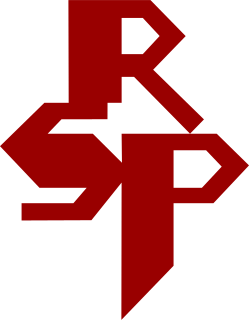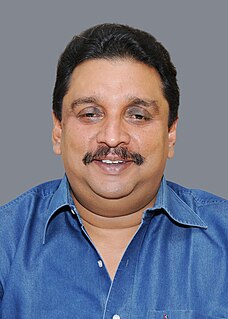Related Research Articles
Trotskyism is the theory of Marxism as advocated by the Russian revolutionary Leon Trotsky. Trotsky identified as an orthodox Marxist and Bolshevik–Leninist. He supported founding a vanguard party of the proletariat, proletarian internationalism and a dictatorship of the proletariat based on working class self-emancipation and mass democracy. Trotskyists are critical of Stalinism as they oppose Joseph Stalin's theory of socialism in one country in favor of Trotsky's theory of permanent revolution. Trotskyists also criticize the bureaucracy that developed in the Soviet Union under Stalin.

The Fourth International (FI) is a revolutionary socialist international organization consisting of followers of Leon Trotsky, also known as Trotskyists, whose declared goal is the overthrowing of global capitalism and the establishment of world socialism via international revolution. The Fourth International was established in France in 1938, as Trotsky and his supporters, having been expelled from the Soviet Union, considered the Third International or Comintern as effectively puppets of Stalinism and thus incapable of leading the international working class to political power. Thus, Trotskyists founded their own competing Fourth International.

The Democratic Socialist Perspective (DSP) was an Australian Marxist political group, which operated as the largest component of a broad-left socialist formation, the Socialist Alliance. In 2010, the DSP voted to merge into the Socialist Alliance.

Revolutionary Socialist Party (RSP) is a political party in India. The party was founded on 19 March 1940 and has its roots in the Bengali liberation movement Anushilan Samiti and the Hindustan Socialist Republican Army. The party got around 0.4% of the votes and three seats in the Lok Sabha elections in 1999 and 2004. It is part of the Left Front (Tripura).
Revolutionary Socialist Party of Kerala (Bolshevik) is formed as a splinter group from RSP in Kerala in 2001. The party leader at the time of its formation was Baby John, formerly an important RSP leader in Kerala.

The Communist Party of the Netherlands was a Dutch communist party. The party was founded in 1909 as the Social-Democratic Party (SDP) and merged with the Pacifist Socialist Party, the Political Party of Radicals and the Evangelical People's Party in 1991, forming the centre-left GreenLeft. Members opposed to the merger founded the New Communist Party of the Netherlands.
The International Revolutionary Marxist Centre was an international association of left-socialist parties. The member-parties rejected both mainstream social democracy and the Third International.

The Revolutionary Socialist Party was a Dutch socialist political party, that has been variously characterized as Trotskyite and syndicalist. In 1935 it merged with the Independent Socialist Party (OSP) to form the Revolutionary Socialist Workers' Party, but most of the former OSP members left the united party the same year. Henk Sneevliet was the RSP/RSAP's undisputed leader throughout its existence, as well as its only Representative.
This article gives an overview of socialism in the Netherlands, including communism and social democracy. It is limited to communist, socialist, and social-democratic parties with substantial support, mainly proved by having had a representation in parliament. The sign ⇒ means a reference to another party in that scheme.
Socialism in India is a political movement founded early in the 20th century, as a part of the broader Indian independence movement against the colonial British Raj. The movement grew quickly in popularity as it espoused the causes of India's farmers and labourers against the zamindars, princely class and landed gentry. Socialism shaped the principal economic and social policies of the Indian government after independence until the early 1990s, when India moved towards a more market-based economy. However, it remains a potent influence on Indian politics, with many national and regional political parties espousing democratic socialism.
Communism in India has existed as a political movement since at least as early as the 1920s. In its early years, the ideology was harshly suppressed through legal prohibitions and criminal prosecutions. Eventually, the movement became ensconced in national party politics, sprouting several political offshoots.

Shibu Baby John is the former Labour Minister of the State Government of Kerala, India. He is former General Secretary of the state's Revolutionary Socialist Party party, which is based in Kerala.Now RSP(Baby John) merged with National RSP and He is now national committie member of Rsp. He is the son of former National Revolutionary Socialist Party (RSP) leader Baby John and Annamma John. His party is part of the Congress-led United Democratic Front.
The Spartacist League is a Trotskyist political grouping. They are the United States section of the International Communist League, formerly the International Spartacist Tendency. This Spartacist League named themselves after the original Spartacus League of Weimar Republic in Germany, but the current League has no formal descent from it. The League self-identifies as a "revolutionary communist" organization.
The International Committee of the Fourth International (ICFI) is the name of two Trotskyist internationals; one with sections named Socialist Equality Party which publishes the World Socialist Web Site, and another linked to the Workers Revolutionary Party in the UK.
The Fourth International (FI), founded in 1938, is a Trotskyist international. In 1963, following a ten-year schism, the majorities of the two public factions of the Fourth International, the International Secretariat and the International Committee, reunited, electing a United Secretariat of the Fourth International. In 2003, the United Secretariat was replaced by an Executive Bureau and an International Committee, although some other Trotskyists still refer to the organisation as the USFI or USec.
The Workers Party (WP) was a Third Camp Trotskyist group in the United States. It was founded in April 1940 by members of the Socialist Workers Party who opposed the Soviet invasion of Finland and Leon Trotsky's belief that the USSR under Joseph Stalin was still innately proletarian, a "degenerated workers' state." They included Max Shachtman, who became the new group's leader, Hal Draper, C. L. R. James, Raya Dunayevskaya, Martin Abern, Joseph Carter, Julius Jacobson, Phyllis Jacobson, Albert Glotzer, Stan Weir, B. J. Widick, and Irving Howe. The party's politics are often referred to as "Shachtmanite."
The Socialist Workers Party (SWP) is a far-left political party in the United Kingdom. Founded as the Socialist Review Group by supporters of Tony Cliff in 1950, it became the International Socialists in 1962 and the SWP in 1977. The party considers itself to be Trotskyist. Cliff and his followers criticised the Soviet Union and its satellites, calling them state capitalist rather than socialist countries.

T.J. Chandrachoodan is an Indian politician. He was elected general secretary of the Revolutionary Socialist Party (RSP) in 2008.
The Socialist Workers Party (SWP) is known as a communist party in the United States. Originally a group in the Communist Party USA that supported Leon Trotsky against Soviet leader Joseph Stalin, it places a priority on "solidarity work" to aid strikes and is strongly supportive of Cuba. The SWP publishes The Militant, a weekly newspaper that dates back to 1928. It also maintains Pathfinder Press.
References
- 1 2 3 4 Robert J. Alexander, "Trotskyism in India"
- ↑ Brownz, Dave (5 November 2012). "Revolutionary Greetings to Workers Socialist Party of India". Redrave.
- ↑ Tyagi, Rajesh (19 March 2016). "Worker Socialist: Running Sore of Kashmir and the Fight for Revolution in South Asia!". Workers' Socialist Party. Retrieved 22 February 2019.
The problem of Kashmir emanates from the reactionary communal partition of 1947. The way forward, thus, is not the secession of territories and further balkanization of the region, but to overturn this partition and re-unite the Indian sub-continent, through a socialist revolution. This socialist revolution in the sub-continent would emerge as part of the world socialist revolution to trigger a broader revolutionary offensive of the working class against all capitalist states in South Asia, overturning them and uniting them into a federation of independent socialist republics.